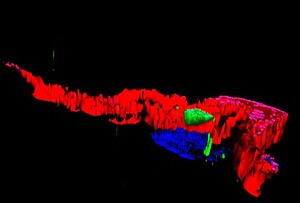Publication date: 08/12/20
ThemesNews Headline news
By studying Alström syndrome, researchers from Inserm and the University of Strasbourg have identified a new therapeutic target for type 2 diabetes. With the firm backing of Conectus*, the research should enter the clinical phase by the second quarter of 2021.
“The paper published in the journal Diabetes is the tip of the iceberg”, smiles Vincent Marion, a researcher at the Laboratoire de Génétique Médicale, who is collaborating with various European laboratories on this research. “Around 80% of obese subjects develop type 2 diabetes, but the reasons for this link have not yet been clearly established”, explains the researcher, who is studying the cellular mechanisms at work in Alström syndrome, a condition that leads to obesity and indeed diabetes.
The disease is caused by mutations in the ALMS1 gene, which encodes a protein. The team discovered that anomalies in the adipose tissue caused by the loss of function of ALMS1 lead to type 2 diabetes in people suffering from Alström syndrome. In animals, restoring the function of this protein restores glycemic control. “By identifying and using a molecule capable of targeting this ALMS1 protein in the adipose tissue of subjects with type 2 diabetes, we hope to be able to control diabetes better, regardless of the level of insulin circulating in these individuals.”
Clinical trials in the USA
In order to achieve this, a company was set up in 2017, which developed a therapeutic tool using a peptide called PATAS. The tool was presented in 2019 to the annual congress of the American Diabetes Association (ADA) in the “Therapeutics” category. Conclusive tests were performed in vitro and in vivo. PATAS targets the ALMS1 protein in the fat cells of subjects suffering from type 2 diabetes, thus restoring glucose use in the cell, which helps to control the diabetes. “We used a rare disease to identify the mechanism. However, the discovery cannot be applied to the disease itself because the protein is mutated”, adds the researcher.
In order to move on to clinical trials, Vincent Marion met with the American laboratories. In September, he had a preliminary interview with the Food and Drug Agency (FDA), the equivalent of the European Medicines Agency, which is known for its high standards. “The FDA gave us very positive feedback about the programme. The trials are going to be conducted with a company in the US that specialises in subjects with type 2 diabetes, whether they are obese or not.”
Marion Riegert
*Société d’accélération du transfert de technologies (Technology Transfer Accelerator Offices)
- Read the September 2020 paper in Diabetes.
- For further information, you can also read our 2016 article on the subject: “Traitement du diabète: une maladie rare oriente la recherche vers les cellules graisseuses”

















